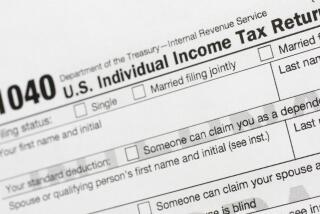Taxpayers Filing at Slowest Pace in 5 Years
- Share via
WASHINGTON — Taxpayers are filing their returns at the slowest pace in five years, and the Internal Revenue Service says smaller than expected refunds may be to blame.
Through Feb. 26, the IRS had received 37.4 million returns, down 8.1% from the 40.7 million received during the comparable period last year.
In its weekly report on filings, the IRS said Thursday that one reason for the slowdown could be that “taxpayers have roughed out their returns and are finding smaller than expected refunds or even balances due.”
In many cases, the IRS said, this bad news resulted from President Bush’s decision last year to reduce withholding for most taxpayers in an effort to increase consumer spending by about $2 billion a month. The permanent withholding change did not raise tax liability; it simply gave taxpayers a part of their refund in each paycheck.
However, average refunds are still larger than a year ago, as they have been throughout the filing season. Thursday’s report said the average this year is $1,078, or 2.8% above last year’s $1,048 level.
The IRS attributed the larger average to an increase in the number of electronically filed returns, which typically have higher average refunds than paper returns. It is not that an electronic return produces a larger refund, but that a taxpayer who expects a big refund is more likely to use the faster electronic system.
Through Feb. 26, the IRS had received nearly 9.2 million electronic returns, up 12.1% from the 8.2 million at this time in 1992. Almost 16 million returns had been certified for refunds, down 6.1% from the 17 million during the same period a year ago.
In making its weekly report, the IRS recommended that any taxpayer expecting a refund not delay filing, because the closer it gets to the April 15 filing deadline, the longer it takes to process a return. The agency said it now is taking an average of four weeks, although electronic filing can cut that time in half.
Those who will owe taxes when they file but cannot pay the full amount should ask for an installment agreement, the IRS said. This will result in added interest and penalties but not as much as if no return is filed.
An installment arrangement can be requested by filing Form 9465 with a return or by simply attaching a note to the return.
More to Read
Inside the business of entertainment
The Wide Shot brings you news, analysis and insights on everything from streaming wars to production — and what it all means for the future.
You may occasionally receive promotional content from the Los Angeles Times.










